Qassem Soleimani used violence to achieve political aims – but the world will miss him if his judgement is replaced by hot-headed emotion
The fear is that the assassination will mark a turning point into open war that no one in the region, or Donald Trump himself, wants

If there is one thing we can all agree on after the US assassinations of the Iranian and Iraqi generals, it is that the ball is now in the court of Baghdad and Tehran.
So how might they respond? The Iraqis are naturally aggrieved – given that it happened in their capital – but find themselves hamstrung in their response by a divided policy on expelling foreign troops, and a military dependence on the US for equipment maintenance and tactical support against the remnants of Isis.
So it is to Iran that we must look for clues as to “what next?”. Russian foreign affairs committee chairman Konstantin Kosachev has commented: “This [assassination] is a big mistake stemming out of a typical American habit of personalising any problem. Saddam should be removed and things will settle down. But this is a logic of a show, not that of politics. It doesn’t work in the long run but may boomerang against the directors of the ‘show’.”
I would agree. And would add the fates of Milosevic, Yanukovych and Gaddafi.
One of the dangers of the focus on the chief victim, Major General Qassem Soleimani, is that it obscures the deeper truth that he was the embodiment of an ideology rather than the ideology itself; killing Soleimani will not kill his cause.
His death had been expected and prepared for; supreme leader Khamenei referred to Soleimani as a “living martyr” and announced the general’s successor shortly after his death, saying: “The plan of the [Quds] Force will exactly be the same as the plan during martyr Soleimani’s tenure.”
The one thing this assassination will not be is decisive – in the sense of being the conclusion to anything. The fear is that it will be decisive in marking a turning point in an escalation of conflict into open war that no one in the region, or Trump himself (for electoral reasons), wants.
Iran is an ancient nation with an ancient culture. This stretches back to its heyday as the world’s largest empire when ancient Greece, from which western civilization takes its roots, was a relatively small power. The desire for respect relating to this cultural depth, as well as Iran’s standing in the region, is a consistent driver of Iranian strategy. Analysts such as professor Ali Ansari, an expert on the region from St Andrews University, would add mercantilism as the other key facet of Iranian attitudes, leading to hard bargaining, competitiveness and pursuit of the deal.
An Omani friend of mine advised that we should not worry about the Iranians, they were easy to deal with – just trade with them. And beneath the separation of Iran from its gulf neighbours at the political level, it is notable how much cross-gulf trade has continued.
Both these drivers can be seen in the way Iranian foreign policy has been created and pursued. Having been on the receiving end of Iranian policy as the British commander in southern Iraq in Basra in 2007, I would judge Soleimani as notable for the judgement shown in his use of military action for political purposes. This strategic judgement on tactical action made him perversely a moderating force who may prove to be missed now he is gone.
I had no doubt in 2007 that it was Iranian technology and resources, notably the IEDs, that were killing our soldiers in the costliest tour post-invasion for the British in Iraq. It was equally clear that this was a measured, controlled effort, enough to accelerate us out (we were leaving anyway) but not enough to provoke huge repercussions or diplomatic embarrassment – they were successful at both.
Twice I saw the Iranians withdraw their tactical tentacles when the political cost grew too high, once over their embarrassment at the kidnap of our 15 sailors in disputed waters off Iran (then head of Iran’s supreme national security council Ali Larijani thought the IRGC had behaved like pirates), and again when we struck back against Iranian infiltration and arrested Soleimani’s operators in Basra in March 2007.
I got the clear impression that the Iranian campaign showed a finely judged use of military assets in support of political goals, a skill at which Soleimani was a master. The same issues can be seen at play in Iranian negotiations over the nuclear deal, known as the JCPOA. Its attractions were twofold for the Iranians. First, they saw themselves treated with respect, on an equal footing with the US, Russia, China and the EU (UK, France, Germany). Second, they saw the incentive of improved trade. The US withdrawal was taken not just as a commercial and political betrayal; it was taken as a cultural insult to an ancient civilization by a 200-year-old experiment of a nation.
The same measured, controlled aggression as we suffered in Basra has been shown in the Iranian response to rising US sanctions since Washington’s withdrawal from the nuclear deal. The Soleimani-directed physical responses to those sanctions were designed to expose the vulnerability of the global oil supply and regional economies to Iranian strikes.
Notable in the take down of ships and the drone strikes on Aramco, the Saudi oil giant – which Washington blamed on Iran – is that they killed no one; the point of these actions was to deter. Trump has not been deterred and the logic of deterrence dictates a sharp response. Let us hope that the Iranians show the same strategic patience and judgement as they did under Soleimani and do not give vent to the more hot-headed emotions as seen on our TV screens.
We should not expect any response until after the official period of mourning is over. Their most potent weapons will be in cyberspace (deniable), drones (precision) and most particularly the use of the regional proxy forces Soleimani spent so much time and effort nurturing across the region. This potential has already been seen in Iraq where the MPs’ vote to back removal of US troops may not have been quorate but was supported by the recently-retired PM and the most powerful militias.
Left to itself, I would expect Iran to launch a campaign of widespread resistance to the US presence in the region, a hybrid war to bring “death by a thousand cuts” rather than the pitched battle the US is set up to win.
With the US already ordering all US citizens out of Iraq, it is possible that, in his death, Soleimani achieves the removal of US forces from the country and possibly the region. That would indeed have made these strikes decisive but not in the way Trump expected.
But it increasingly seems as if Iran is not as alone as once might have been the case. The US will have noticed that in the last few weeks, there have been joint Chinese, Russian and Iranian naval exercises in the Gulf of Oman. Indeed, Chinese dependence on oil from the Gulf, including from Iran (in defiance of US sanctions), means that China is likely to be a restraint both on Iranian plans to block the Straits of Hormuz and a complicating factor on US plans physically to attack Iran and trigger such a block.
Iran is a key player geographically in this century’s shift from an Atlantic to a Eurasian focus, firmly in the sights of Russia and China.
The killing of Soleimani is likely to accelerate the drift of Iran from isolation towards embracing the east. Suddenly, this encounter between the US and Iran becomes a much larger game than expected, the consequences of which are getting increasingly hard to foresee. And therein lies the danger of miscalculation – on all sides.
Major General Jonathan Shaw was Director Special Forces (DSF) and the commander of UK forces in southern Iraq in 2007


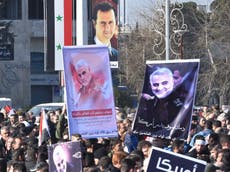
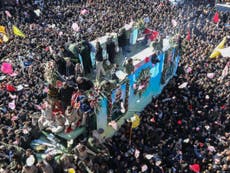
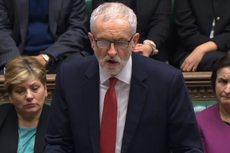
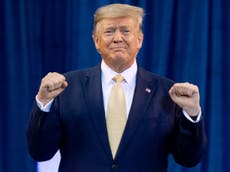
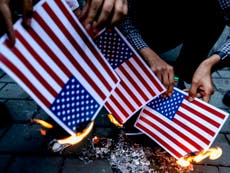
Join our commenting forum
Join thought-provoking conversations, follow other Independent readers and see their replies